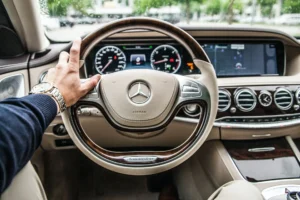When deciding between trading vs selling your car. It’s important to understand each option’s benefits. Let’s explore these options and learn about their pros and cons. When you trade in your car, you basically trade it in for another vehicle at a dealership. This option can be very attractive if you want to change vehicles or if you just feel like switching. Trade in allows you to conveniently switch to a new car without the hassle of having to find a buyer for your old one.
On the other hand, selling involves finding a buyer. This option gives you more control over the selling process and, potentially, a higher selling price. However, it also requires more effort on your part, as you will have to advertise, negotiate and manage all the paperwork.
The key difference between trading vs selling is the convenience factor each offers. Buying and selling eliminates the need for private sales and the associated time consuming tasks. It saves you the stress of haggling over prices or worrying about finding a reliable buyer.
In a Nutshell
- Trading in your car can be a convenient option if you are looking to upgrade to a newer or different model without having to sell your current car separately.
- When trading in your car, the dealer will usually offer you a trade in value, which is the amount they are willing to deduct from the price of the new car in exchange for the old one.
- While trading in your car may be more convenient, you may not get as much money as you would if you sold it privately.
- Selling your car privately gives you the opportunity to negotiate a higher price and potentially make more money on the sale.
- Selling your car privately requires more effort on your part, such as advertising it, meeting with potential buyers and completing the paperwork.
- Selling your car privately can also take longer than delivering it, as finding the right buyer can sometimes be a lengthy process.
- It is essential that you research the market value of your car before deciding whether to trade it in or sell it, as it will help you make a more informed decision.
- Trading in your car can be advantageous if you want to minimize the hassle and time involved in a private sale.
- Ultimately, choosing between trading vs selling your car hinges on your personal priorities, whether it be convenience, maximizing profits, or a combination of both.
However, considering the unique aspects of trading vs selling is crucial. While buying and selling may be easier, private sale can offer you a better price and more control over the process.
Ultimately, the decision between trading in or selling your car depends on your personal preferences, your financial situation and your time constraints. Weighing the pros and cons of each option will help you make the decision that best suits your needs.
Trading in your car may not always result in the greatest immediate cash value, but it can offer valuable flexibility and convenience.
Kelley Blue Book
Deep Dive into Trading Your Car
Advantages of Trading vs Selling Your Car
Trading in your car offers several advantages over selling it outright. One of its main advantages is the ease and convenience it offers. When you trade in your car, you simply go to the dealership, hand over the keys and walk away with a new vehicle. This avoids the hassle of finding a buyer, negotiating the price and going through the paperwork of a private sale.
Another advantage in the debate of trading vs selling your car is potential tax benefits. In some states, you may only have to pay taxes on the difference between the price of your old car and the new one you are buying. This can result in significant cost savings compared to selling your car independently.
Exploring the Disadvantages of Trading vs Selling Your Car
While trading in your car can offer convenience, it is also important to be aware of the potential disadvantages. One disadvantage is that you may receive a lower price for your vehicle compared to private sale. Dealers need to make a profit when they resell your car, so they may offer you a lower trade in value than you could get through a private sale.
A notable drawback of trading vs selling your car is the limited choices at dealership. If you trade in your car at a particular dealership, you may be limited to choosing your next vehicle from their inventory. This could restrict your options and potentially limit your ability to find the exact make and model you want.
In conclusion, trading in your car offers you ease, convenience and potential tax advantages. However, it’s important to consider the potential lower price value and limited dealer options when deciding if this option is right for you.
Practical Steps in Trading vs Selling Your Car
Assess the value of your car: Before you turn in your car, it’s important to determine its value. Use resources such as online price guides or consult professional appraisers to get an accurate estimate. Take into account factors such as the vehicle’s age, mileage, condition and current market demand. Knowing the value of your car puts you in a better position during negotiations.
Prepare the car for trade in: To maximize the trade in value of your car, spend some time on its appearance and functionality. Clean the car thoroughly, inside and out, and get rid of any personal items. Repair minor flaws and perform basic maintenance, such as oil changes and tire rotations. Keep service records handy to prove that your car has been well maintained.
Negotiate the best deal: When you turn in your car, don’t immediately accept the dealer’s first offer. Do your research and know the current market prices. Present the prepared trade in value and be prepared to negotiate based on its value. Consider requesting quotes from several dealerships to compare offers. By being assertive and aware of your car’s value, you can potentially increase the value of your trade in.
Trade in or sell your car: If you decide to trade in your car rather than sell it, you should consider the pros and cons. Trading in your car may be faster and more convenient, as the dealer handles the paperwork and logistics. However, selling your car privately may come at a higher price and give you more control over the transaction. Weigh your options based on your priorities and make the decision that best suits your goals.
Remember that selling your car requires careful evaluation, preparation and negotiation. If you follow these practical steps, you can navigate the buying and selling process smoothly and get the best offer for your vehicle.
Case Study: Successful Car Trading Experience
In today’s fast paced world, many people are faced with the decision to trade in or sell their car. While selling a car can be a straightforward process, car trading offers an alternative solution that can present several advantages. In this case study, we will discuss a real world example of a successful car trade in experience, highlighting the benefits and key considerations for people looking to trade in their vehicles rather than sell them.
Background: Sarah is a professional who recently decided to refurbish her old car. Sarah had heard about the possibility of trading in her car rather than selling it. She set out to investigate this possibility further because of the potential benefits.
Research and decision making: To make an informed decision, Sarah thoroughly researched car trading. She discovered that one of the main advantages of selling her car was the convenience it offered. Instead of dealing with several potential buyers, setting up appointments and negotiating the price, she realized that buying and selling would allow her to complete the transaction in a single visit to the dealership.
In addition, Sarah discovered that car trading could save her money. By deducting the trade in value from the price of a new vehicle, she could reduce the total cost of the upgrade. This financial aspect was very appealing to her, as it was a cheaper option compared to selling her car independently and then buying a new one.
Execution and results: Once Sarah decided to trade in her car, she took it to a reputable dealership known for good deals. The dealership thoroughly inspected her vehicle, taking into account factors such as its condition, mileage and market demand. Sarah was pleasantly surprised when the dealer offered her a trade in value that exceeded her expectations. This positive outcome was an excellent starting point in her search for a new vehicle.
With the trade in offer in hand, Sarah browsed the dealership’s inventory and found a car that met her requirements. By using the trade in value to offset a portion of the cost of the new car, she realized considerable savings. This approach gave her peace of mind knowing she had gotten a fair deal and avoided the pitfalls of selling her car privately.
Conclusion: The success of Sarah’s car buying and selling experience highlights the advantages that can be enjoyed by private individuals considering car buying and selling as an alternative to selling their vehicles independently. The convenience, potential cost savings and streamlined process offered by car trading can make the upgrade process much simpler and more satisfying. By choosing a reputable dealer and doing thorough research, individuals can ensure a positive buying and selling experience, as Sarah did.
Whether you want to upgrade your car or explore new options, trading in your car rather than selling it can be a viable and rewarding option. Consider the benefits highlighted in this case study, as they provide valuable insights into the advantages of car trading in versus selling.
Deep Dive into Selling Your Car
Deepen the sale of your car When it comes to getting rid of your trusty vehicle, you have two options: trade it in or sell it. In this article, we’ll look at the pros and cons of selling your car so you can make an informed decision.
Advantages of Selling Your Car
- Possibility of earning more: selling your car privately can often fetch a higher price than trading it in. By cutting out the middleman, you have the opportunity to negotiate a better deal with potential buyers, maximizing your profits.
- Control over the sales process: When you sell your car, you are in control. You decide the price, how and where to advertise it, and you even choose the ideal buyer. This level of control guarantees you the best possible outcome for your vehicle.
Drawbacks of Selling Your Car
- Lengthy process: selling your car privately can be a time consuming task. From creating attractive ads to scheduling test drives and negotiating with prospective buyers, it requires a significant investment of time and energy.
- Potential security risk: Dealing with strangers can pose a security risk. It is essential to take precautions when meeting with potential buyers, such as arranging meetings in public places and bringing an escort.
In conclusion, trading vs selling your car has its pros and cons. Selling your car privately can offer you the possibility of earning more and give you full control of the process. However, it can also be time consuming and carry some security risks. Consider these factors carefully to make the best decision for your situation.
Essential Steps in Trading vs Selling Your Car: The Selling Process
Preparatory actions before selling:
- Gather all necessary documents: Before selling your car, gather important documents such as the title, maintenance records and any warranties.
- Obtain a vehicle history report: Provide prospective buyers with a clear view of your car’s history by obtaining a vehicle history report, ensuring transparency and building trust.
- Clean and inspect your car: A clean and well maintained car will attract more buyers. Detail the exterior and interior, fixing any minor problems and performing necessary maintenance.
- Set a competitive price: Research the market value of your car and set a price that reflects its condition and mileage.
Promotion and negotiation strategies:
- Write a compelling ad: Craft an engaging and detailed description of your car, highlighting its unique features and any recent upgrades or repairs.
- Take quality photos: Capture attractive images of your car, making sure it has good lighting and focusing on its best angles. Include photos of the interior, exterior, trunk and engine.
- Advertise heavily: Use online platforms, social media and local classified ads to maximize your car’s exposure to potential buyers.
- Be responsive and flexible: Respond quickly to inquiries, schedule test drives and be open to negotiation. Being accommodating can increase the chances of a successful sale.
Complete the transaction:
- Be cautious during test drives: Verify the buyer’s driver’s license, accompany him or her during the test drive, and ask for a refundable deposit to demonstrate your seriousness.
- Close the deal: Once the price has been agreed upon, draw up a sales contract that includes the details of both parties, the details of the car and the conditions of sale. Make sure both parties sign the document.
- Receive payment securely: Prioritize secure payment methods such as cashier’s checks or wire transfers, avoiding cash transactions.
- Transfer ownership: Transfer the title to the new owner by signing and dating it. File the necessary paperwork with your local Department of Motor Vehicles.
When considering trading vs selling your car, weigh the pros and cons of each option. Trade in is more convenient, as you can use the value of your current car for a new purchase. However, private sale usually offers a higher sale price. Evaluate your priorities and financial goals to determine which option best suits your needs.
By following these practical steps, you’ll be well prepared to sell your car effectively and maximize its value. Good luck with the sale.
Comparison: Trading vs Selling Your Car
When parting with your car, the main choices are trading vs selling: Which suits you? But which is the best option for you? Let’s take a closer look at the key factors to consider.
Economic Considerations in Trading vs Selling Your Car
Turning in your car for trade in is convenient because it allows you to put its value toward a new vehicle. Dealers usually offer a fair trade in value, so it’s a hassle free option. On the other hand, selling your car privately may involve more effort, but can fetch a higher price.
Personal Factors in Deciding Between Trading vs Selling
Your personal needs and preferences also play a crucial role in the decision making process. If you prioritize convenience and a smooth transaction, buying and selling may be the best option. However, if you have the time and inclination to handle the selling process yourself, you could make more money with a private sale.
Alternatives to Trading vs Selling: Other Options to Consider
Aside from trade in or sale, there are a couple of alternative options worth exploring. If you’re leasing a car, the buyback option allows you to keep the car permanently at the end of the lease period. In addition, donating your car to a charity can provide you with a tax deduction while supporting a good cause.
In conclusion, the choice between trading in or selling your car ultimately depends on your specific circumstances. Evaluate the economic factors involved and consider your personal preferences; then decide which option best suits your needs. In the event that neither buying nor selling seems right for you, exploring the possibility of buying or donating your car may offer you alternative ways to part with your vehicle.
Environmental Impact: A Crucial Aspect of Trading vs Selling Secisions
Let’s take a closer look at the environmental factors of both options.
In trading vs selling, consider the carbon footprint of new cars when trading in. Manufacturing new vehicles requires the use of resources and energy, which contributes to greenhouse gas emissions. By trading in your car, you are indirectly supporting the production of a new vehicle and increasing its carbon footprint.
In the context of trading vs selling, the disposal and recycling of traded in cars have environmental implications. Although trading in your car may provide you with a new owner, the final fate of the vehicle is uncertain. Proper disposal and recycling procedures can minimize the environmental impact, but the potential for waste to end up in landfills remains.
Conversely, selling the car in the trading vs selling debate promotes its prolonged use. Extending the useful life of a car reduces the need to manufacture new cars, which translates into a reduction in resource consumption and greenhouse gas emissions. This is a positive environmental factor to consider when selling your car.
In addition, there are green initiatives in car sales that promote sustainability. Some car sales platforms prioritize green practices, such as using electric vehicles for transportation or ensuring fuel efficiency during the sales process.
Ultimately, when deciding whether to trade in or sell your car, it is crucial to consider the environmental impact of your choice. Whether it’s supporting the manufacture of new vehicles or encouraging extended use, every decision can make a difference in minimizing our environmental footprint.
Wrap Up
In summary, deciding whether to trade or sell your car involves weighing convenience against potential financial gain. Trading offers a straightforward, quick process with immediate results, ideal for those seeking convenience and a swift transition to a new vehicle. However, it might not yield the highest financial return due to dealer overheads.
Selling privately could secure a higher price but requires more effort, including advertising, negotiation, and paperwork management. It’s a choice that suits those willing to invest time for a better financial outcome.
Ultimately, the decision hinges on your personal needs, financial goals, and lifestyle preferences. Assess your situation carefully, consider your priorities, and make a choice that aligns with your long term objectives, whether it’s the ease of trading or the potential profit from a private sale.
FAQs

Trading your car to a dealer for another vehicle, while selling your car involves finding a buyer and getting paid in return.
Trading in your car allows you to conveniently exchange it for a new vehicle without having to go through the process of selling it privately. In addition, you may receive a trade in value that you can use as a down payment on the new car.
Selling your car privately often offers the possibility of getting a higher price than the trade in value a dealer gives you. It also gives you more control over the selling process and allows you to negotiate with potential buyers.
Trade in values offered by dealers are generally lower than the prices you would get through a private sale. Dealers have to factor in costs such as reconditioning, advertising and potential profit when determining the trade in value. In a private sale, you can set the price based on market conditions and the condition of your vehicle.
Some key factors to consider are the convenience and time savings of trade in versus the possibility of obtaining a higher price in a private sale. In addition, the condition and popularity of your car may also influence your decision. To make an informed decision, we recommend that you research trade in values and private to private sale prices for your particular make and model.
Article sources
At Capital Maniacs, we are committed to providing accurate and reliable information on a wide range of financial topics. In order to achieve this, we rely on the use of primary sources and corroborated secondary sources to support the content of our articles.
Primary sources, such as financial statements and government reports, provide firsthand evidence of financial events and trends. By using primary sources, we are able to directly reference information provided by the organizations and individuals involved in these events.
Secondary sources, such as financial analysis and commentary, interpret and analyze primary sources. While these sources can be useful for providing context and background information, it is important to use corroborated sources in order to ensure the accuracy and reliability of the information we present.
We take pride in properly citing all of our sources, both primary and secondary, in order to give credit to the original authors and to allow our readers to verify the information for themselves. We appreciate your trust in our website and are committed to upholding the highest standards of financial journalism.
- Consumerreports.org – Pros and Cons of Trading vs. Selling Your Car
- Creditkarma – Should I Sell or Trade in My Car?
- Thezebra – Should I Trade in My Car or Sell it Myself?
- Cars – Should You Trade in Your Car or Sell It Privately?
- Hennessympg – should you sell or trade in your car to the dealer?


























